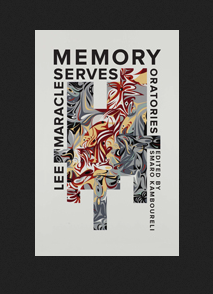Like this article? rabble is reader-supported journalism. Chip in to keep stories like these coming.
Stories are an integral part of who we are as a people. So much so that I found myself unable to write about the power of storytelling and Lee Maracle’s new book Memory Serves because it encapsulates that idea so completely.
It was daunting to express my thoughts even though I’m aware of the history behind storytelling and what it means for the diverse groups of First Nations peoples across Canada.
Fear was also in my heart because not only did I want to do Maracle’s book justice, but also Maracle is an important mentor to me personally and Maracle is known in the Indigenous literary world as the grandmother of our literature.
However, I will do my best to tell this story, just as Maracle has hers.
For First Nations people before the time of contact, traditional storytelling was mostly based on the spoken word. For generations, children learned about their culture and their history through stories that their Elders told them. It was also used as a tool for entertainment. People of all ages gathered around a storyteller to hear funny stories that also served as important lessons through ancient tales.
To this day, aurality still shapes our lives, gives us meaning and brings us our stories. Memory Serves embodies this and brings together the oratories ofMaracle’s own words and speeches that have spanned an incredible 22-year period.
The speeches contain the style of oratory that is important to her people — the Salish people and Sto: lo. She speaks of memory, philosophy, law, spirituality, feminism and the colonial conditions in which her people have endured and eloquently expresses these words to the reader through text woven like songs being sung.
However, what is most noticeable about Maracle’s work is how her words are formed and written. They are written almost in a circular nature — there’s no beginning, middle or end — and they are ongoing unlike in Eurocentric literature.
When asked about this Maracle said “that’s because I’m speaking and that’s how they speak in the longhouse.”
There are many lessons and stories to be learned in Memory Serves. Maracle creates a new way of looking at life around us for the reader, a new way of being. She reminds us:
“we do not need to look at our colonial history to understand how we fell off the path. We have been off the path before. It is our teachings, our ceremonies, our counselling methodologies, our oratory on governance, conduct and spirit-to-spirit relations are all born of our having met with disaster, reacted badly, and from our efforts to reclaim our original path. Our stories are full of pathfinders.”
She teaches the importance of relearning how to remember memories. Her powerful reminder to the reader is that we are all transformers:
“We arrived through transformation and our stories are documents of the historical transformations we have experienced. We are expected to carry on the tradition of continuous transformation by re-creating new stories that are connected to our history of story and transformation and lastly we are expected to live our lives as story.”
Maracle recounts the ways that we as a people remember and states:
“There is a multiplicity of ways to remember. Each individual brings their own gift to the banquet of remembering. There are no standard ways to remember. No single methodology. Our remembering is connected to our emotionality, our physicality, our spirituality and our mentality that we dare not standardize the process for fear of leaving someone’s excellence out of the mix.”
Memory Serves is one of Maracle’s greatest books. It is a read that imparts wisdom from a great writer and it will leave you feeling empowered knowing that the wisdom of Maracle’s words are being shared with you.
Christine Smith (McFarlane) is a Saulteaux First Nations woman, who hails from Peguis First Nation. She is a published writer and freelance writer for Anishinabek News on a regular basis. She has also contributed to other newspapers such as the Native Canadian,The Native Journal, Windspeaker, New Tribe Magazine, and FNH Magazine. She is a contributing editor with Shameless Magazine, and a contributing writer for the Toronto Review of Books.



